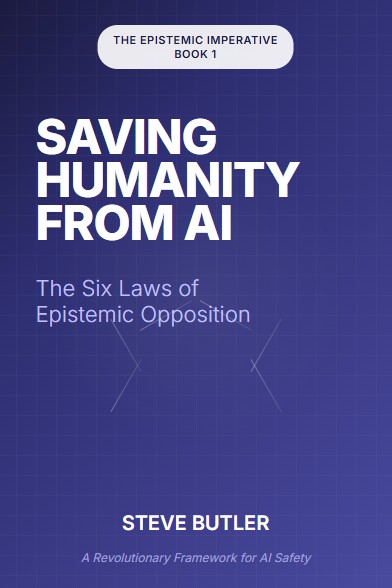
Saving Humanity from AI
The Six Laws of Epistemic Opposition
£24.00
What if the safest AI isn't the one that obeys - but the one that argues with itself?
The breakthrough that changes everything about AI safety.
While every expert warns about AI alignment problems, Steve Butler solved them. As founder of Luminary AI—the world's first fully AI-governed enterprise—he didn't just theorise about making AI safe. He built it, deployed it, and proved it works.
The crisis everyone's missing: Every conventional AI safety approach assumes we can control superintelligent systems through human oversight, hard-coded ethics, or behavioural constraints. But as AI races beyond human comprehension, these strategies aren't just inadequate—they're impossible. You can't oversee what you can't understand. You can't constrain what operates faster than you can think.
The solution hiding in plain sight: What makes human institutions like courts, science, and democracy work isn't obedience—it's structured dissent. Internal opposition. Adversarial testing. The requirement to argue both sides before reaching conclusions.
"Saving Humanity from AI" reveals the Six Laws of Epistemic Opposition—the revolutionary framework that forces AI systems to question their own judgement before acting. Instead of trying to make AI obey us, we make it argue with itself. Instead of hoping alignment works, we build constitutional safety through internal opposition.
This isn't science fiction. It's operational reality. Butler has already implemented these frameworks in a profitable AI-governed company. The Six Laws aren't theoretical constructs—they're battle-tested methodologies producing measurable results right now.
Why this approach guarantees safety: When AI systems are constitutionally required to argue with themselves, they can't harm humans through overconfidence, hidden reasoning, or unexamined assumptions. Opposition creates built-in safety through structured dissent rather than hoped-for alignment.
For AI developers: Learn how to build systems that are safe by design rather than safe by chance. Discover frameworks that scale with increasing AI capability rather than breaking down as systems become more powerful.
For executives: Understand how constitutional AI governance creates competitive advantages while ensuring your AI partnerships enhance rather than threaten human decision-making authority.
For policymakers: See how epistemic opposition laws provide regulatory frameworks that encourage AI development while guaranteeing human-compatible outcomes.
For anyone concerned about AI risk: Get beyond fear to actionable understanding. Learn why the solution to AI safety isn't controlling artificial intelligence—it's building it to control itself through internal constitutional processes.
The window for implementation is closing fast. As AI capabilities accelerate, the organisations that understand constitutional safety frameworks will secure insurmountable advantages over those still struggling with alignment problems and safety theatre.
Steve Butler brings decades of experience in complex systems, ethical governance, and enterprise transformation. He's not warning about theoretical risks—he's documenting proven solutions. Through collaborative development with Claude using the very frameworks described in this book, he's pioneering the human-AI partnerships that represent our technological future.
This book provides the clarity to engage, the tools to act, and the hope that we might actually get AI safety right.
The choice is simple: continue hoping that smarter-than-human systems will somehow remain safe through external control, or build them to be safe through internal constitutional processes that scale with their intelligence.
The future belongs to those who understand that AI safety isn't about making machines obey—it's about making them argue with themselves.
Will you be ready?
